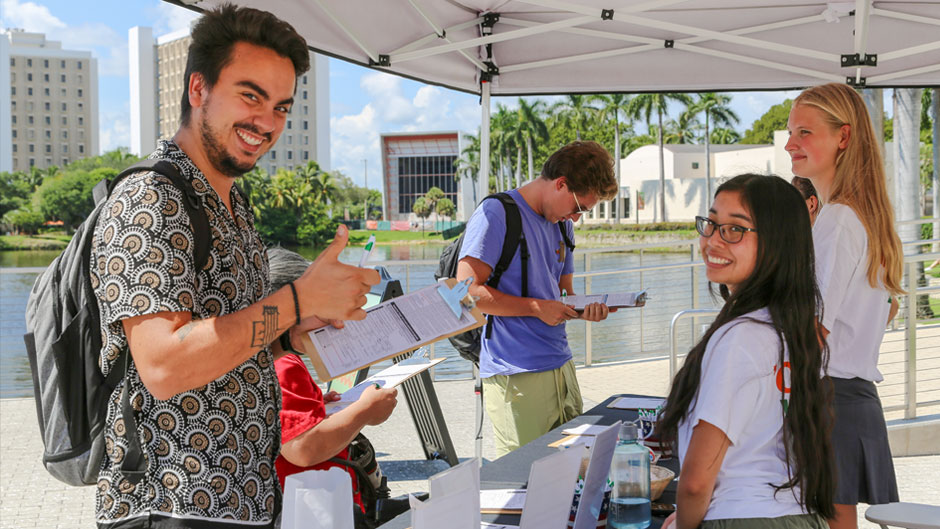For young people, it is easily understood how being constantly told that the weight of the future lies on their shoulders can, at times, go in one ear and out the other. However, as seen with the recent midterm election, the future already seems to be upon them.
According to AP VoteCast and early exit polling, roughly 1 in 8 voters in the country were younger than the age of 30, and more than half of them overwhelmingly supported Democratic candidates. The turnout, while traditionally on the lower end for midterm elections, was more than enough to result in some historic elections and show a significant voting pattern for that group.
“There was an assumption that [young voters] weren't going to turn out in particularly high numbers,” said Matthew Nelsen, an associate professor of political science at the University of Miami whose research specializes in race, ethnicity, urban politics, and youth socialization.
“What we actually saw within our data, and certainly what we saw with turnout, was that just because Gen Zers don't necessarily feel super engaged in the day-to-day minutia of the campaign cycle, we shouldn't confuse that as a sense of political apathy,” he added.
Generation Z, typically called Gen Z and referring to those born between 1997-2012, has faced a culmination of issues that have potentially impacted their reasons for heading to the polls. These include growing up in the COVID-19 pandemic and witnessing the historic overturning of Roe v. Wade by the U.S. Supreme Court in June.
According to Nelsen, any and all of these could be potential factors on why more Gen Zers voted this November.
“This is a generation that came to political age during a global pandemic, they came to political age under Donald Trump's administration,” Nelsen said. “All of those things are motivating factors for young people. They know how to make informed political decisions, and they know how to take political action even if they're not following politics day in and day out.”
Young voters also may have made a difference in some of the historic local elections this season, with many resulting in Democratic wins.
“Even though Millennials and Gen Z do tend to break toward the Democratic party, that's due in no small part to the fact that these are generational groups that are more racially and ethnically diverse,” Nelsen noted. “This is not only a story about the political behavior of all young people, but specifically the political behavior of young people of color, specifically Black, Asian American, and Latin young people.”
Some of the historic candidates elected to office include Wes Moore, Maryland’s first Black governor; Maura Healy of Massachusetts and Tina Kotek of Oregon as the nation’s first-elected lesbian female governors; and Maxwell Frost of Florida, the first Gen Z U.S. representative. In particular, Frost’s election has proven to be especially influential, with many young voters seeing themselves in the 25-year-old advocate.
“It’s nice to have people from our age group being elected to Congress, finally,” said Izzy Sowells, a junior double majoring in political science and biology. “Especially because there’s so many older people as representatives right now. I’m really hoping [Frost] will bring some new ideas to the table.”
One of the most notable outcomes still to be decided is in Georgia, where Sen. Raphael Warnock is opposed by Republican Hershel Walker in the Dec. 6 runoff. Sterling Cole, a junior from Atlanta studying political science at the University, has noted his desire to participate in the upcoming contest.
“The most important thing on the ballot for me is having someone who will represent Georgia well, regardless of policy or political affiliation,” said Cole. “But as far as policies, I'm really interested in expanding Medicaid and lowering medical costs for seniors and other people. I'm also really passionate about immigration, and gun violence is a really big thing in Atlanta. So, supporting law enforcement and supporting gun control measures are things I’m really looking at,” he added.
In terms of how influential Gen Z’s votes will continue to be in the coming years, Cole said that he hopes it becomes a habit among young people to turn out to the polls—and in even bigger numbers.
“I think we play the most important role in any election. Because we have the most to gain or the most to lose,” Cole said. “I think if we vote and make our voices heard, no matter what it is, these are all things that will affect us the most for the longest amount of time. That’s why we need to continue going out to vote.”

